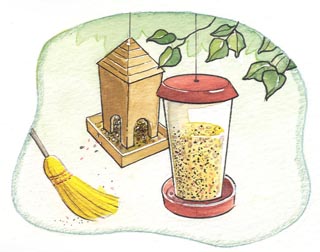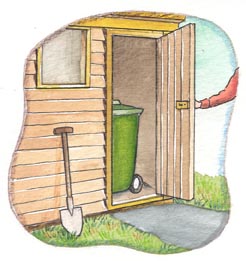
Feeding Wildlife in Backyard Requires Thought and Care
by Albert Rand
Many people enjoy the viewing opportunities provided by feeding wildlife in their yards. Others think it is necessary to help wildlife survive. However, this practice may cause more harm than good to the health and safety of both animals and humans.
In most cases, birds and other wildlife do not require food provided by humans. Maintaining natural habitat throughout Nova Scotia is of greater benefit to wildlife populations. Most wildlife populations vary in abundance over time due to habitat conditions, disease, predation and weather severity. Feeding wildlife will increase local populations through higher survival rates, which quite often interferes with natural processes. As more animals survive, there are fewer resources for the group as a whole, as well as for other species that depend on the same resources. Eventually a shortage of food, or disease, will affect un-naturally high populations.
Providing an abundant and consistent food source affects foraging patterns. Wildlife will continue to return to where they found an easy meal, and in residential areas, the animals' natural fear or shyness of humans will decrease. This has a particularly negative impact on juveniles, as they don't learn the necessary skills of recognizing and finding natural foods. Feeding frequently increases animals' travel near or across roads and highways endangering not only the wildlife, but the travelling public as well.
 Bird feeding is very popular, but the practice is primarily for humans' own viewing pleasure and entertainment. Remember that feeders often attract deer, raccoons, mice, rats, squirrels and even black bears. This can be minimized by reducing spillage. For the safety of the birds, feeders must be kept clean. Be vigilant about removing wet, spoiled seed and bird droppings that can contaminate the feed and cause disease.
Bird feeding is very popular, but the practice is primarily for humans' own viewing pleasure and entertainment. Remember that feeders often attract deer, raccoons, mice, rats, squirrels and even black bears. This can be minimized by reducing spillage. For the safety of the birds, feeders must be kept clean. Be vigilant about removing wet, spoiled seed and bird droppings that can contaminate the feed and cause disease.
Feeding wildlife can be a health risk to you and your family. Rats, mice, squirrels, raccoons, skunks, and deer act as hosts for Blacklegged Ticks, carriers of the bacteria that cause Lyme disease. In areas where Blacklegged Ticks are well established (Admiral Cove in Bedford, Town of Lunenburg and surrounding area, and Gunning Cove and Churchover near Shelburne), it is stressed not to feed wildlife.
Most raccoons in Nova Scotia carry an intestinal parasite called 'raccoon roundworm'. When raccoons feed in residential areas, there is an increased risk of pets and people being exposed to the parasite. While rarely transferred to people, if it is, it can be very difficult to diagnose and treat effectively. Most confirmed cases have involved children who came in contact with raccoon feces. Dispose of any known raccoon feces (without directly touching it) as soon as possible and treat the area with bleach or a strong household disinfectant.
 Other activities can inadvertently attract wildlife. Reduce the chances of nuisance wildlife visits by always removing food residue from your barbecue and surrounding area, practicing proper household waste disposal and composting techniques, and feeding pets indoors. And while you may enjoy wildlife, consider the impact it may have on your neighbours. Animals, especially deer, seldom confine their visits to the property where they are being fed and can cause considerable damage to the shrubs, gardens, and crops found on adjacent properties.
Other activities can inadvertently attract wildlife. Reduce the chances of nuisance wildlife visits by always removing food residue from your barbecue and surrounding area, practicing proper household waste disposal and composting techniques, and feeding pets indoors. And while you may enjoy wildlife, consider the impact it may have on your neighbours. Animals, especially deer, seldom confine their visits to the property where they are being fed and can cause considerable damage to the shrubs, gardens, and crops found on adjacent properties.
We are fortunate in Nova Scotia to share our environment with an abundance of wildlife. Attracting wildlife into populated and developed areas, however, has the potential to cause a host of problems for the animals and for ourselves, neighbours and pets. The best "care" we can provide wildlife to ensure their health and continued existence, is to maintain quality habitat and healthy ecosystems where possible... and keep wildlife "wild".